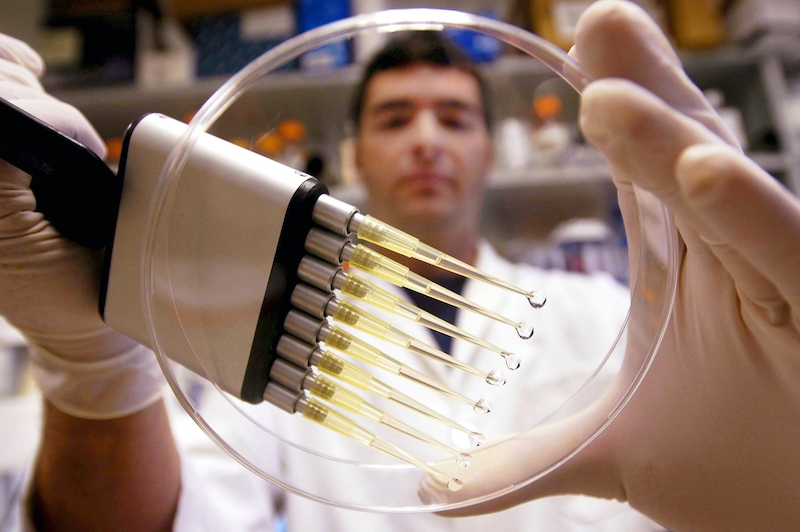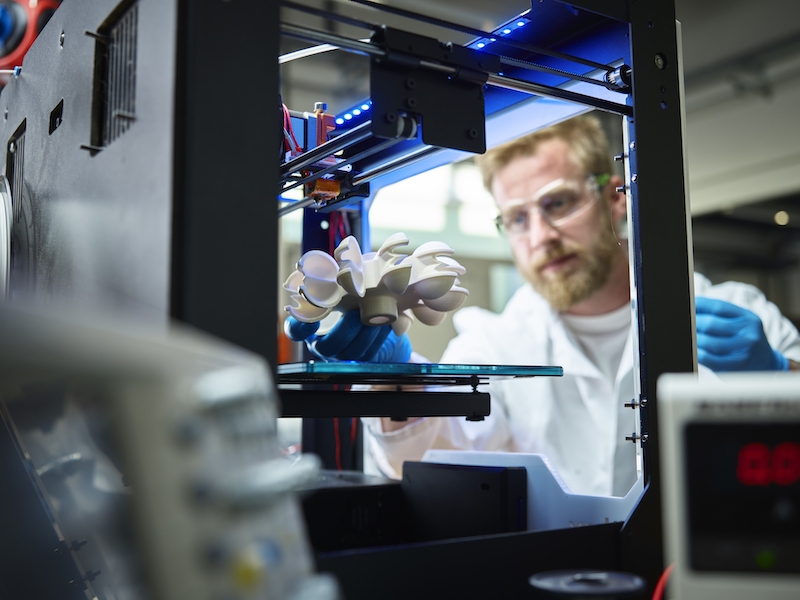Health Innovations
Ending the COVID-19 pandemic will rely on three key factors driven by scientific research:
- Testing — detection of symptomatic and asymptomatic patients as well as patients who have recovered.
- Treatment — medical intervention to slow and end transmission of the disease.
- Protection — effective, affordable and available protective equipment for health care workers and the general public.
UT Austin researchers are on the front lines of identifying and deploying new approaches to predict, prevent and treat COVID-19.
Explore Research Opportunities - Diagnostics
Your support will advance our research efforts to fight COVID-19 now and help minimize or prevent future outbreaks.
Adaptation of the pioneering MasSpec Pen technology, which broke new ground in the rapid diagnosis of cancer, for direct, hand-held, rapid sampling and analysis of COVID-19.
Livia Schiavinato Eberlin, College of Natural Sciences
Application of newly discovered, high-throughput phenotyping methods to better predict wildly variable differences in patient vulnerability and outcomes, helping to predict infection progression, facilitate customized patient care, improve health outcomes and reduce the load on medical staff and equipment.
Joydeep Ghosh, Cockrell School of Engineering
Development of a remote, home-monitoring system for individuals diagnosed with COVID-19 that provides the tools for early identification and intervention for those needing an escalation in care without risking widespread exposure.
Elizabeth Jacobs, Dell Medical School
Paul Rathouz, Dell Medical School
Development of a rapid blood-based assay that detects viral biomarkers to predict a patient’s vulnerability and response to treatment of COVID-19, supporting clinical decision-making on optimal treatment.
Alan Lambowitz, College of Natural Sciences
Development of novel viral RNA and serological testing methodology to provide COVID-19 infection monitoring for health care workers, limiting the spread and impact of the pandemic.
Andreas Matouschek, College of Natural Sciences
Andrew Ellington, College of Natural Sciences
Jimmy Gollihar, College of Natural Sciences
Gregory Ippolito, College of Natural Sciences
Edward Marcotte, College of Natural Sciences
Chris Sullivan, College of Natural Sciences
Nick Bryan, Dell Medical School
Clay Johnston, Dell Medical School
Jason Lavinder, Cockrell School of Engineering
Jessica Podnar, Vice President for Research
A project to engineer the SARS-CoV-2 spike protein — one of the key targets for effective therapy — to improve manufacturing and stability for improved vaccines and diagnostics.
Jennifer Maynard, Cockrell School of Engineering
Ilya Finkelstein, College of Natural Sciences
Jason McLellan, College of Natural Sciences
A study to identify high-affinity antibodies to the COVID-19 spike protein that can be used in post-care diagnostics with saliva samples, creating materials needed for a rapid point-of-care diagnostic that can be done in the lab or with a modified iPhone.
Jennifer Maynard, Cockrell School of Engineering
Development of a novel, non-invasive and rapid breath test to detect COVID-19 infections in real time, utilizing UT Austin’s state-of-the-art chemical ionization mass spectrometer.
Pawel Misztal, Cockrell School of Engineering
Tanya Hutter, Cockrell School of Engineering
Kerry Kinney, Cockrell School of Engineering
Atila Novoselac, Cockrell School of Engineering
Juan Maestre, Cockrell School of Engineering
Development of a non-biological test based on passively captured digital traces such as voice, breathing and coughing sounds, helping to solve the urgent need for an early-detection mechanism to help health workers triage individuals who need biological tests.
Edison Thomaz, Cockrell School of Engineering
Research using analysis of viral genomic data to enable discovery of disease transmission patterns, improving understanding of the spread of COVID-19 and its transmission dynamics, aiding identification of vulnerable social groups, tracing disease origins and aiding discovery of potential new mutated strains.
Haris Vikalo, Cockrell School of Engineering
Development of an accurate, low-cost, point-of-care diagnostic device with high sensitivity, specificity and throughput, providing the large-scale early diagnosis of COVID-19 critical to managing the current outbreak and preventing future pandemics.
Yuebing Zheng, Cockrell School of Engineering
Explore Research Opportunities - Therapeutics
Your support will advance our research efforts to fight COVID-19 now and help minimize or prevent future outbreaks.
Investigation of the use of a low-cost, emerging therapy to control the runaway immune response caused by COVID-19 and to prevent lung injury, ventilator use and death while maintaining defense against ongoing infection.
Tom Brenna, Dell Medical School
Kumar Kothapalli, Dell Medical School
John Powers, Dell Medical School
Herbert Tobias, Dell Medical School
Support for a UT resource that helps faculty bring their academic discoveries to market, ensuring that discoveries in diagnostics, pharmaceuticals, digital health, and medical devices make a positive impact in Texas and beyond.
Jay Brown, Dell Medical School
Development of a new technology to store and transport vaccines without the need for refrigeration, allowing for rapid distribution of life-saving medicine around the globe.
Maria Croyle, College of Pharmacy
A project to formulate chloroquine and hydroxychloroquine treatment into a dry powder for inhalation, administering a more effective dose directly into the lungs, stopping the COVID-19 virus, reducing dosages and minimizing toxicity.
Zhengrong Cui, College of Pharmacy
Robert Williams III, College of Pharmacy
Assembly of a multi-disciplinary research consortium across three UT Austin colleges to launch an integrated drug discovery effort, marshalling resources to screen new drug targets, repurpose FDA-approved drugs and develop new drugs to treat COVID-19 and future outbreaks.
Kevin Dalby, College of Pharmacy
Eun Jeong Cho, College of Pharmacy
Zhengrong Cui, College of Pharmacy
Walt Fast, College of Pharmacy
Tamer Kaoud, College of Pharmacy
Mo Maniruzzaman, College of Pharmacy
Hugh Smyth, College of Pharmacy
Robert Williams III, College of Pharmacy
Andrew Ellington, College of Natural Sciences
Jon Huibregtse, College of Natural Sciences
Yan Zhang, College of Natural Sciences
Blerta Zhemalce, College of Natural Sciences
Pengu Ren, Cockrell School of Engineering
Development of the first suite of immune-based therapies designed to be effective and ready for deployment against COVID-19, as well as the emerging viruses we are likely to face in the future.
Bryan Davies, College of Natural Sciences
Chris Sullivan, College of Natural Sciences
Kristin Mondy, Dell Medical School
Repurposing of a class of widely available, existing drugs called polycomb inhibitors as a therapeutic against COVID-19, creating effective therapy that could be easily deployed to treat patients.
Vishwanath Iyer, College of Natural Sciences
Chris Sullivan, College of Natural Sciences
Research to develop the first vaccine for COVID-19 that targets the immune system’s T-cells, rather than the more common approach of targeting antibodies.
Ning Jiang, Cockrell School of Engineering
Esther Melamed, Dell Medical School
Gregory Ippolito, College of Natural Sciences
Development of a novel, 3D-printed, patient-specific drug delivery system allowing for dosage of therapies based on a patient’s personal physiological and biological characteristics and delivered in an accessible, cost-friendly system that can be manufactured on demand.
Mohammed Maniruzzaman, College of Pharmacy
Jiaxiang Zhang, College of Pharmacy
Development of a novel, phage-based vaccine platform for use as a rapid-development, quick-to-scale-up vaccine against COVID-19, one that is easier, faster and less expensive to produce in comparison to standard vaccine production.
John Powers, Dell Medical School
Research to develop a broad-spectrum antiviral treatment capable of effectively combating COVID-19 as well as future viruses.
Chris Sullivan, College of Natural Sciences
Yan Zhang, College of Natural Sciences
Kevin Dalby, College of Pharmacy
Research to develop an oral and inhaled therapy using the therapeutic agent niclosamide, an existing, FDA-approved drug that has already been confirmed as one of the antiviral drugs most potent against COVID-19.
Robert Williams, College of Pharmacy
Zachary Warnken, College of Pharmacy
Development of treatment that abolishes COVID-19’s ability to camouflage its genome in human cells, preventing its escape from the innate antiviral response of our immune system.
Blerta Xhemalce, College of Natural Sciences
Explore Research Opportunities - Protectants
A project to develop reactive materials which can make masks and HVAC filters active against COVID-19 and a range of other respiratory viruses, reducing transmission and improving our capacity to produce personal protective equipment. Your support will advance our research efforts to fight COVID-19 now and help minimize or prevent future outbreaks.
Development of a simple, functionalized material to mass-produce cloth-type masks with highly effective (>99.99%) virus removal properties.
Manish Kumar, Cockrell School of Engineering
Debadyuti Ghosh, College of Pharmacy
A project to address the critical shortage of N95 respirator masks by designing an alternative filter that achieves N95-level performance, bypassing the bottleneck in the supply chain and dramatically improving the availability of personal protective equipment for health care workers.
Arumugam Manthiram, Cockrell School of Engineering
Atila Novoselac, Cockrell School of Engineering
A study to investigate how a range of chemical disinfectants are absorbed by the skin, informing policies and practices to ensure the increased use of disinfectants remains safe for human health.
Pawel Misztal, Cockrell School of Engineering
Kerry Kinney, Cockrell School of Engineering
Atila Novoselac, Cockrell School of Engineering
A study of the chemical interactions between disinfectants and mask materials, surfaces and indoor air spaces where they are being used, illuminating the impact of disinfection on human health and protecting health during and following disinfection.
Lea Hildebrandt Ruiz, Cockrell School of Engineering
David Allen, Cockrell School of Engineering
Lydia Contreras, Cockrell School of Engineering
Richard Corsi, Cockrell School of Engineering
Pawel Misztal, Cockrell School of Engineering
Atila Novoselac, Cockrell School of Engineering
A project to determine the heat thresholds necessary to make COVID-19 inactive, providing the basis for thermal-based strategies to rapidly remove the virus from community spaces.
Chris Rylander, Cockrell School of Engineering
Matthew Hall, Cockrell School of Engineering
Nichole Rylander, Cockrell School of Engineering
A study to determine whether ozone generation is a feasible strategy for decontaminating face masks, helping to keep our first responders, medical staff, general population and patients safe from COVID-19 and other dangerous pathogens.
Marissa Rylander, Cockrell School of Engineering
Matthew Hall, Cockrell School of Engineering
Chris Rylander, Cockrell School of Engineering
Nichole Rylander, Cockrell School of Engineering
A project to develop reactive materials which can make masks and HVAC filters active against COVID-19 and thereby reduce transmission, improving our capacity to produce personal protective equipment.
Navid Saleh, Cockrell School of Engineering
Giving to Research at UT Austin
Our research teams are well equipped to pursue the breakthroughs in testing, treatment and protection needed to respond to COVID-19.

Breadth of research disciplines
From chemistry to molecular biosciences to engineering, we have the capacity to swiftly repurpose existing products and develop new ones.

Cutting-edge experts
UT researchers are utilizing state-of-the-art molecular and proteomic techniques, 3D printing and bio-printing, handheld mass spectrometry, gene therapy and other new technologies.
